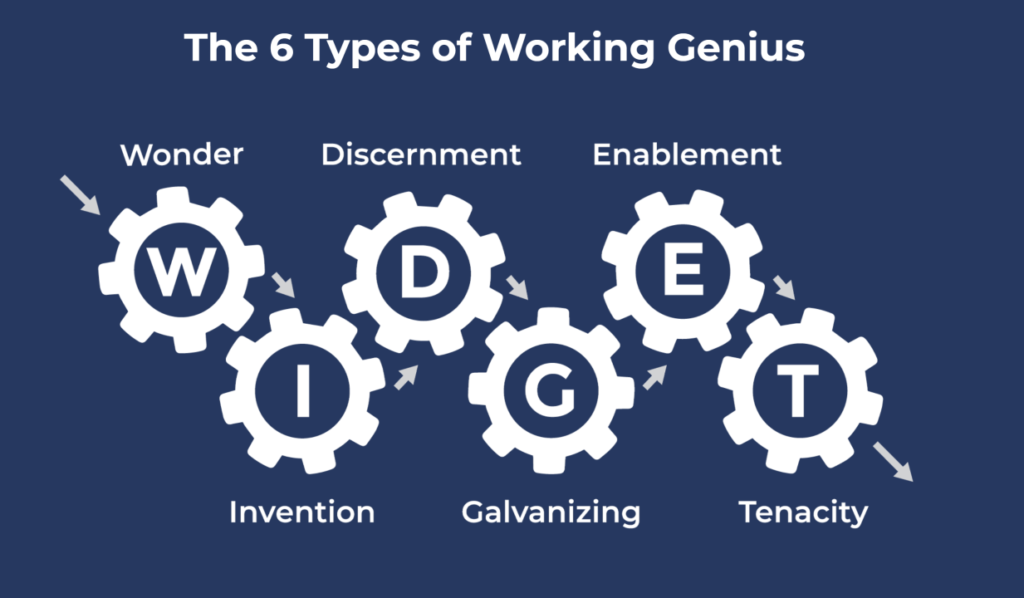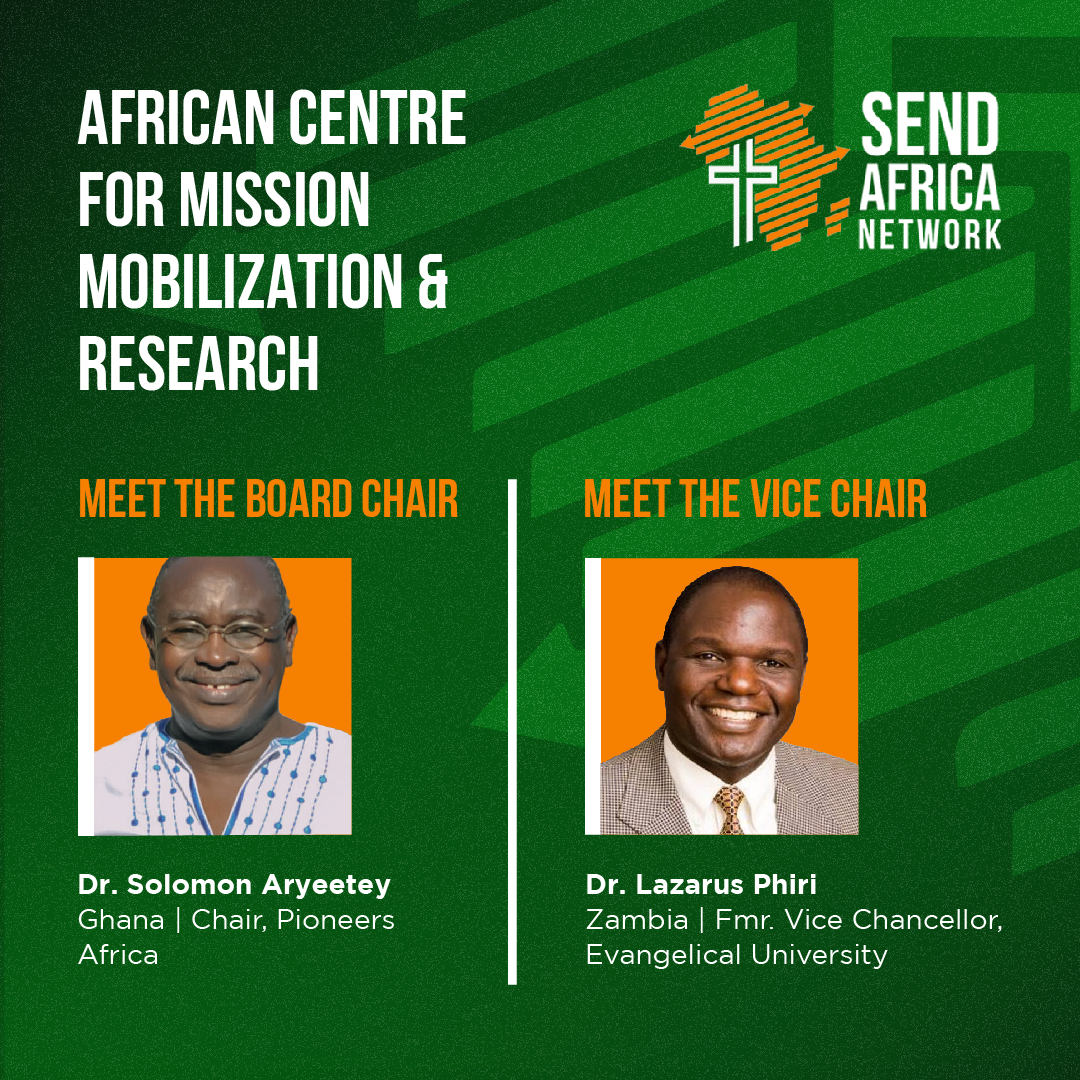
No Limit On God-sized Visions; But For Our Egos & Logos.
The year I turned 40 is the same year that Africa became the continent with the most Christians in the world. Wanting both momentous occasions to mean something beyond a year and a number, I had been musing over the idea of an ‘African Centre for Global Mission Mobilization’ for serious research and intellectual power to be brought to bear on this African phenomenon which is undoubtedly the work of God’s Spirit.
In fact, in the first quarter of 2018 I even initiated discussions with Steve Shadrach’s Centre for Mission Mobilization about the possibility of partnering to pull off an ‘African Centre for Global Mission Mobilization’ in Ghana. At that time, I was still President of International Student Ministries Canada and incidentally had my entire Senior Leadership Team visiting Ghana from Canada. In the presence of my ISMC team, friends and family from near and far, during my fortieth birthday dinner on 16th March 2018 at the Fiesta Royale Hotel in Accra, Ghana we actually formally launched the idea (or should I say effort?). I had no clue how it was going to pan out but I sensed it was not just a good idea; it was a God idea.
THE BRAZIL BENEDICTION
Unbeknownst to me, Mr. Ebenezer Aryee, a Ghanaian health worker domiciled in the United Kingdom and serving on the board of Pioneers Pioneers UK, had also been independently pondering over the prospect of an ‘Africa Centre for Mission Mobilization and Research’ since about 2017 and mooted the idea to Pioneers UK as well. Incidentally, Eben and I first met in person at the Global Mobilization Network’s conference in Dubai that same year but had no such discussions.
Come 2019, at the next biennial Global Mobilization Network’s conference in Sao Paolo (Brazil) in December 2019, both of us found out that we had a similar vision from the Lord and decided to explore what a possible convergence and synergy could result in for the sake of the greater Kingdom of God. Incidentally, that is the same conference at which upon hearing Dr. T.V. Thomas’s stirring exhortation about “radical collaboration” for the sake of the global Church finishing the task Jesus Christ left us, I agreed to co-author Africa to the Rest with Sam Ngugi, although I had started the book the year prior and was more than half-way, or so I thought.
SUPERSONIC SPEED SINCE SAO PALO
Since that time in Sao Paolo, many other African men and women from all over the continent, and in the diaspora, ranging from mission practitioners to academics, have been consulted and/or roped in. After an initial year of various research, discussions and SWOT analysis by this array of consultants, it became so overwhelmingly clear that not only was the African Centre for Mission Mobilization & Research (ACMMR) an idea whose time had come, but also that it was an urgent one for that matter. An interim board was set up by Send Africa Network, itself a new pan-African mission agency that Eben and a couple of others were in the process of founding and roped me in. The ACMMR interim board comprised Dr. Harvey Kwiyani (Malawi/UK), Prof. Philip Antwi-Agyei (Ghana), Dr. Lazarus Phiri (Zambia), Dr. Andrew Mkwaila (Malawi), Dr. Esther Mombo (Kenya), Dr. Joshua Bogunjoku (Nigeria/USA), Madam Angéle Kalouche Biao (Benin) and Rev. Ebenezer Aryee (Ghana/UK). I had the honour of chairing it.
The centre was outdoored, online, at Send Africa’s first summit, online, in 2021. This interim board, among others, determined that Ghana might be the most suitable place to physically site the ACMMR, with possible satellites across the continent. After physically scouting a number of possible places and holding various bilateral talks, the Akrofi-Christaller Centre for Theology Mission and Culture (ACI) was finally settled on as the most germane.
SEND AFRICA NETWORK SUMMIT 2022
At the November 2022 Send Africa Summit in Accra, Ghana, a hybrid summit, among the several dignitaries present was Dr. Rudolph Gaisie, director of the Centre for the Study of Early African Christianity (CESEAC) at ACI (the significance of him being there would soon become apparent). A fundraising event was held for the ACMMR and a permanent board commissioned comprising: Dr. Harvey Kwiyani (Malawi/UK), Rev. Dr. Solomon Aryeetey (Ghana), Mr. Alan Webster (South Africa), Dr. Lazarus Phiri (Zambia), Rev. Daniel Hyde Appiah (Ghana), Ps. Kassum Balboné (Burkina Faso), Mr. Sam Ngugi (Kenya), Rev. Ebenezer Aryee (Ghana/UK), Madam Angéle Kalouche Biao (Benin) and Dr. Yaw Perbi (Ghana/Canada). A delegation from the new board and some delegates from the Send Africa Summit paid a courtesy call on the Registrar of ACI, Mr. Ben Asiedu, at the Akropong premises. Dr. Rudolph Gaisie took the group on a tour of the facilities, while sharing some of the vital history of the institute.
Rev. Dr. Solomon Aryeetey, medical doctor and founder of Pioneers Africa, was elected as the substantive board chair, at the board’s inaugural meeting, online, in December 2022. Dr. Lazarus Phiri, immediate pst Vice Chancellor of the Evangelical University in Zambia was selected as his vice, while Mr. Alan Webster of Wycliffe South Africa serves as the secretary.
LESSON LOOMING LARGE
There is no end to what God can do with humans who are willing to listen to His instructions and collaborate with His people. Usually, you know a vision is of God when it is far bigger than you and you know you firstly, you’ve got to depend on him and secondly, that you need others to rally around it. Once when I was struggling with taking up the offer to be ISMC president because I preferred to focus on building ‘my own baby’ The HuD Group as the founder and Global CEO, the Holy Spirit brought to mind the instructive words of a mentor of mine, who for years had been Dr. John C. Maxwell’s Senior Vice President at his leadership organization called EQUIIP in Atlanta. He had said to me: “For a long time, the Kingdom of God has not advanced the way it should because of egos and logos.” Ouch.
Imagine that the powerful Africa to the Rest making its rounds around the world would not have happened the same way without my co-author’s unique perspective, experience and network from East Africa. Today, we have a group of scholars from five or six countries collaborating to turn the book into a resource course for tertiary students. At the start of August 2023, Operation Mobilization’s ship ministry, Logos Hope, reached out to stock the ship with 500 copies of Africa to the Rest to be distributed across the continent, from Mombasa to Seychelles, and beyond. What if my ego and logo had gotten in the way.
As I type this, plans are far advanced to organize the formal signing of a Memorandum of Understanding between ACMMR and the Centre for the Study of Early African Christianity (CESEAC) at ACI, with an inaugural lecture on the serene premises. Neither Eben or myself even have our faces on ACMMR posters or our names as chair, or even vice chair or executive director. I dare say most of the people pushing the vision today don’t even know this back story I’ve just shared here!
And that is the beauty of making the only ‘ego’ that matters be the glory of God and the only ‘logo’ that is of prime concern, the cross of Jesus Christ! The aim of the centre is knowledge-based total mobilization of the most numerically Christian continent this century for the mission of God..
Indeed, if it is true that one would chase a thousand and two will put ten thousand to flight, then imagine what is exponentially possible with convergence and synergy. See what unity of purpose devoid of egos and logos could result in for the sake of the greater Kingdom of God. So you see, there is no limit on God-sized visions; but for our egos and logos.
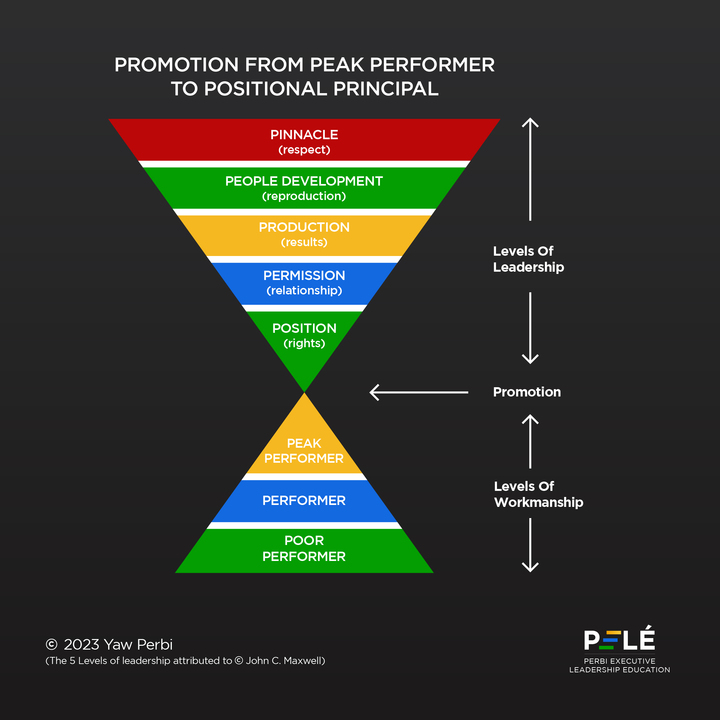
The Best Promotions are the Worst.
Here’s the worst thing about the best promotion. At one of my organizations, we recently had to let an excellent hire go. Come to think of it, we failed him. We failed him by promoting him.
You would think that all promotions are good but no. One of the worst kinds is being ‘elevated’ to become a leader just because you are an outstanding worker or producer. Working on stuff and excelling is very different from working with souls to excel. The reward for hard work is more work, weird yes, but the latter tends to be more mental work than manual —which most people find as more beneficial—also, more of working with people than working on things.
As one person shared about struggling with leadership upon her first promotion as a telco manager: “Within one month, I went from being the best programmer to the worst supervisor.” I’ve seen this happen to too many people in too many places. I grew up on the University of Ghana campus (both my grandfather and mother were professors there) and I would see time and time again fine lecturers promoted into leadership positions, from heads of department through deanship to vice-chancellorship and flail and fail. How many times have I said that a great chemist or erudite historian doesn’t necessarily make a great leader!
We do the same in the medical world, promoting top surgeons to head departments or if God doesn’t intervene, to head the hospital! When I was promoted to supervise the Military Polyclinic at the 37 Military Hospital in Accra, determining the doctors scheduling and all, in my opinion it was only because I wasn’t a bad doctor and had been around long enough. And no one gave me a minute’s training about leadership. Squat. Thank God I had been a private student of leadership for years prior.
It doesn’t start out as a bad thing; in fact, it is exhilarating at first for the recipient of the promotion. And the giver of the opportunity ordinarily also means well and feels good about it. But organizational leaders need to rethink the notion of making people supervisors, managers or leaders as a reward for diligent or even skillful individual technical work. It can backfire, seriously.
A STORY I CAN’T GET OVER
One of the most poignant illustrations of this phenomenon of worker/rewarded-as-leader is told by my mentor Bill George in his book ‘True North.’ It’s about the person who confessed upon her first promotion as a telco manager, “Within one month, I went from being the best programmer to the worst supervisor.” Here are some more details:
“It’s unbelievable how bad I was. I didn’t know how to delegate. When somebody had a question about their work, I’d pick it up and do it. My group was not accomplishing anything because I was on the critical path of everything. My boss saw we were imploding, so he did an amazing thing: He gave me every new project that came in. It was unreal. At 4:30 PM, my team would leave, and I’d be working day and night trying to dig through this stuff.
“Finally, I couldn’t take it any longer. I went to his office, stamped my foot like a 5-year-old, and said, “It’s not fair. I have the work of 10 people!” He sad calmly, “Look out there. You have 10 people. Put them to work.” It was such a startling revelation. I said sheepishly, “I get it.”” [1]
If this person hadn’t eventually learned to lead people, she would never have made it to becoming president and CEO of the American Red Cross on June 23, 2008. Prior to that she had also held top management positions at AT&T Corporation and Fidelity Investments. She is a member of the board of trustees of Johns Hopkins University and the board of directors of DTE Energy.
This is Gail J. McGovern we’re talking about here, even recognized by Fortune magazine in 2000 and 2001 as one of the top 50 most powerful women in corporate America. Alas, not all of such stories that begin with such ‘good promotions’ end well, and even when they do, not without significant damage to many.
DIAGNOSIS OF LEADERSHIP FAILURE POST PROMOTION
It takes both a different mindset and skill set to move from being an excellent worker to being a good leader, let alone a great one. Yet we come to the world of work with both a mindset and skillset that ill-prepare us for leadership success. Even prior, we are socialized largely to excel as individuals. I concur with Bill George that this unpreparedness is attributable to our upbringing:
“…so much of our early success in life depends upon individual efforts, from the grades we earn in school to our performance in individual sports to our initial work assignments. Admissions offices and employers closely examine those achievements and use them to make comparisons. …As we are promoted from individual roles to leadership, we believe we are being recognized for our ability to get others to follow us…
“To become authentic leaders, we must discard the myth that leadership means having legions of supporters following us as we ascend to the pinnacles of power. Only then can we realize that authentic leadership is serving people… How else can they unleash the power of their organization unless they motivate people to reach their full potential? … Only when leaders stop focusing on their personal needs and see themselves as serving others are they able to develop other leaders.” [2]
ROAD MAP TO LEADERSHIP SUCCESS POST PROMOTION
If Maxwell’s 5 Levels of Leadership is anything to go by, then when one is promoted from the top echelons of the worker floor (Peak Performer/Worker Level 3 in diagram above), they only end up at Level 1 of leadership: Position. The lowest level of leadership—the entry level, if you will—is position. People only follow if they believe that they have to (otherwise you might use your powers of carrot and stick). If this leader takes the hint and invests in their leadership growth, they can move to Leader Level 2—Permission—which is based on relationship. At this level, people choose to follow because they want to.
You will notice that even what Gail was trying to get done at work, putting the 10 people ‘out there’ to work, is still only mid-level in the Maxwell scheme of things: Production. Good leaders know how to motivate their people to GTD – get things done! And getting things done is what Leader Level 3 is all about. But they’re only good; not great. Leader Level 4 — People Development—can be summed up in another word: Reproduction. One’s goal at this level is to identify and develop as many leaders as one can and investing in them to help them grow. Here (Leader Level 4), you’re producing people as leaders, not producing work through people (Leader Level 3).
The most challenging and highest level of leadership, Level 5, is the Pinnacle. According to Maxwell, it requires longevity as well as intentionality in investing one’s life into the lives of other leaders and organizations for the long haul (while growing yourself as lifelong learner all the while). People follow such because of who they are and what they represent. Their leadership gains a positive reputation, betters still, one has earned respect.
Note that Level 5 leaders develop Level 5 organizations. I will add that in the leader versUs institutions debate—as to whether it is strong leaders or strong institutions we need to develop long-term—I would say that it takes Level 5 leaders to build the structures and systems that produce strong institutions. This is the realm of legacy. As a result, Level 5 leaders often transcend their position, their organization, their industry and perhaps even their nation.
And nothing accelerates leaders through these levels, from 1 to 5, like intentional coaching.
CONCLUSION
As you can tell already, it’s a long way from being the best worker to being a great leader. There is nothing more painful than a “highly capable individual” (as Jim Collins puts it) thinking that just because they’ve been a peak performer and ‘made it’ onto the supervision, management or leadership floor that they’ve got what it takes to run the ship. One’s productive contribution through individual effort in knowledge, skills and good work habits won’t cut it. As promoters, if we promote people and fail to plan a leadership growth path alongside that, we’ve inadvertently planned to fail them.
Congratulations on your promotion, but to ensure that dream-come-true doesn’t become a nightmare, and the reward a trap instead, you must be aware that it’s a floor and not the ceiling. Top floor workers’ triumphal entry through the golden portal of promotion only lands you as a ground floor leader. Welcome to Level 1 of Leadership: position. Just that.
References
[1] Bill George. True North: Becoming an Authentic Leader. Second edition; expanded and updated edition. Jossey-Bass, Hoboken, NJ, 2015, pg. 186-187.
[2] Ibid, pg. 185
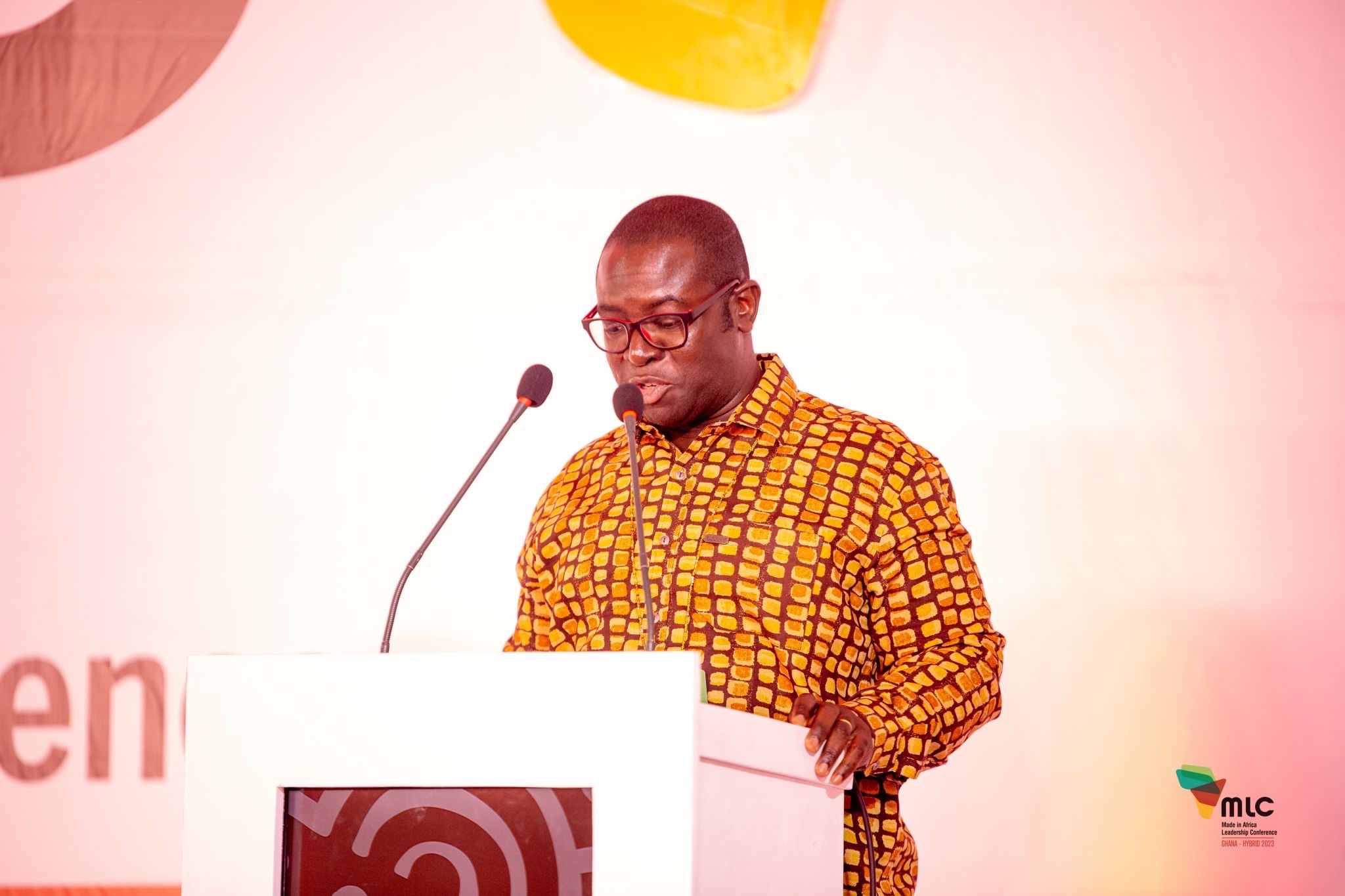
Sans Leadership–So Much to Lose, Too Much to Lose.
The following was shared as a TED-like talk to open the Made in Africa Leadership Conference by BCA Leadership on June 14 at the Marriot Hotel, Accra, Ghana.
My uncle died. My mom’s youngest brother. He came over to Ghana from the United States, where he had lived for decades, and fell ill. He died in the very hospital I worked in at the time. In fact, he died on my ward. But I can swear it wasn’t his disease that killed him. It was leadership, or rather the lack thereof. Leadership is too important for doctors not to have it.
Some of the most important things in life are not taught in school, like leadership. When some of my friends from university got into government I did exhort them: “Nobody taught us Jack about leadership. LEARN LEADERSHIP! CONTRACT COACHES! Leadership is not just caught; it is taught.” Did they listen? Ha!
Ironically, communal, national, continental or even global leadership, is a deeply person-al thing. It takes deeply transformed leaders to deeply transform society. Authentic leadership begins with aligning what goes on in a leader’s head and heart with True North. Leadership principles or True North are no respector of persons—red or yellow, black or white.
Two days from now, we will be officially launching the 20th anniversary celebration of The HuD Group, a holistic leadership organization started by nine young Africans in Accra. From one country in West Africa, it now has presence in 24 countries, on all six continents. Out of Africa to the Rest. From a former Rwandan refugee now in executive leadership in Uganda to a former child soldier in Sierra Leone now a high-ranking bank official in his homeland, to a Chinese-Canadian who we trained via Skype when she was an international medical student in Australia, a lot of transformation and impact has been achieved but in Ghana in particular I feel much of our gains have been eroded by not giving adequate attention to political leadership.
So today is the first of two important occasions this week where I will be drumming home this point with all my heart, liver, spleen and intestines: “Leadership is too important to leave it to politicians alone.” AND with 90% of African businesses being SMEs, creating 60-80% of our jobs and accounting for 40% of our GDP, what we do here at MLC this week for African leaders and African leadership is wildly important.
When two 14-year old stowaways from Guinea, Yaguine and Foday, froze to death in the landing gear of an Airbus 330 from Conakry to Brussels, they had on them a hand-written letter labelled: IN CASE WE DIE… to the Messrs. members and officials of Europe.
They said, among other things, “We have the honor and pleasure and great confidence in you to write this letter … we appeal to your solidarity and kindness for help in Africa. …we, African children and youth, ask you to create a great, efficient organization for Africa to allow us to progress. …we want to study and we ask you to help us in Africa to study to be like you.”
You should find and read the whole letter here—it will thaw and tear your heart. And that was 24 years ago. Has anything changed?
It’s time for Leadership Made in Africa that makes Africa work for Africans. BEFORE WE DIE. Yes we can, partnering and collaborating to reimagine and reform the Africa that we want! Twende! Let’s go! Let’s do this!
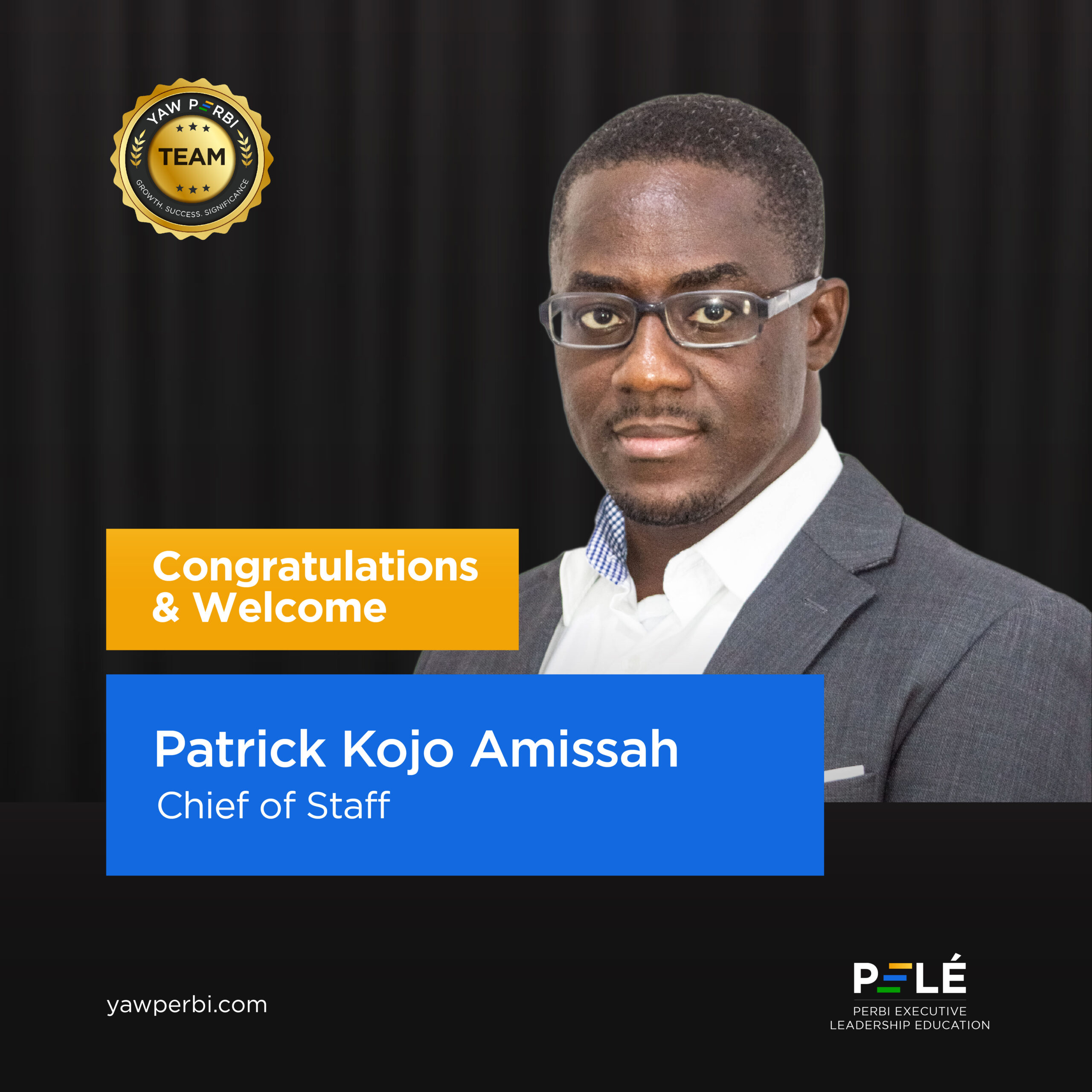
Perbi Executive Leadership Education (PELÉ) Gets New Chief of Staff: Introducing Patrick Kojo Amissah.
Perbi Executive Leadership Education (PELÉ) and allied Perbi establishments heartily welcome Mr. Patrick Kojo Amissah as our new Chief of Staff. Kojo Amissah is a versatile professional with experience in organisational leadership, team and operations management. He believes in striving for excellence and critically analysing problems with the goal of coming up with practicable, innovative solutions. He has worked in the educational, publishing and financial sectors.
Kojo’s previous work experience includes co-managing a start-up (Catalyst Learning Limited) and growing it into a sustainable firm. His responsibilities included structuring and establishing different roles and tasks, recruiting and training staff, establishing systems, managing finances, and planning and executing projects. For over three years he led in the development, printing and distribution of over five million copies of textbooks and workbooks to various schools across Ghana. He managed communications and relations with foreign printing firms including negotiating prices and planning the delivery of printed books.
We are convinced that the skills and knowledge gained from these experiences will enable him to quickly adapt to the demands of the Chief of Staff role at PELÉ and to exceptionally perform the outlined responsibilities. Mr. Amissah possesses good leadership and team management skills which he honed while serving as Team Leader, Curriculum Development and as Chief Operations Officer. Watch out for PELÉ’s online leadership courses to be launched by mid 2023.
Mr. Amissah developed important team building and conflict management strategies as he directly and indirectly managed over thirty individuals performing different roles. He also possesses good negotiation skills and valuable stakeholder management experience. At PELÉ, we believe these are important transferable skills that will aid his interactions with staff of Perbi Executive Leadership Education and affiliated organisations like Perbi Cubs, Kwiverr, The HuD Group, Send Africa, Adeshe Real Estate, ISMCanada, PAIS, Africa to the Rest, BCA Leadership, the Lausanne Movement etc. Kojo takes the baton from Ashesi cum University of Warwick alumna Araba Andoh who laid pioneering tracks for the role.
According to Kojo, “I am highly motivated to serve in the role because it provides the opportunity for me to put my unique mix of experience in leadership, operations management and publishing to use in the worthy cause of growing executives to make significant impact in society. I also believe that working directly with an accomplished leader and entrepreneur like Dr. Yaw Perbi is an unmissable opportunity to grow professionally.” Among Kojo’s first tasks will be helping to host the incoming BCA Leadership Made in Africa Leadership Conference, launching PELÉ’s avant-garde DeepLEAD online leadership course and providing operational support for both The HuD Group’s 20th anniversary activities and Kanéval by PerbiCubs/UNESCO Accra World Book Capital. In commemoration of the latter, Dr. Yaw Perbi seeks to (re)publish all his two dozen books.
We welcome Mr. Kojo Amissah at this inflexion point where YAW PERBI is transitioning to PELÉ (Perbi Executive Leadership Education) to maximize team potentials beyond the availability and capability of Dr. Yaw Perbi as an individual. PELÉ by YAW PERBI is an Executive Education firm that offers authentic and customized relationships and resources to C-Level executives to grow personally, succeed professionally and become significant societally. PELÉ’s vision is to see a flourishing global ecosystem of authentic leaders characterized by growth, success and significance.
Kojo wields a Bachelor’s degree from the University of Ghana and an MBA from Coventry University. He is a practising catholic. Akwaaba, Kojo. Bienvenue, Monsieur Amissah. Here’s to your own growth, success and significance. Together, let’s carpe diem and make a dent in the universe!
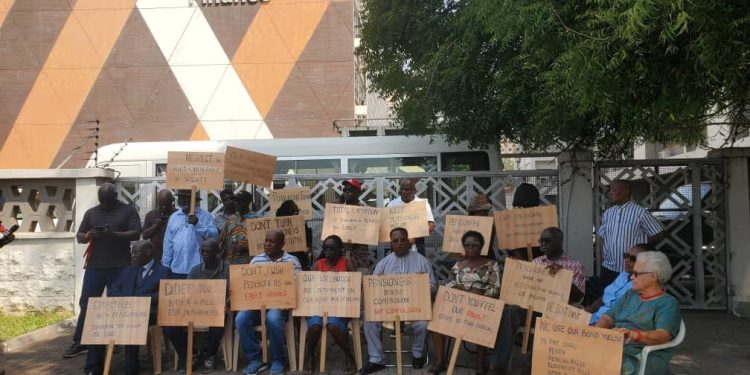
FROM PROFESSOR TO PICKETER: The Lost Generation and the Missing Money
Ghana is neither worth living for nor dying for. That’s how many feel at the moment. Honestly. Think about this: I’ve known Uncle Kweku since his graduate student days on the University of Ghana campus. I was only a lad then. He would later complete his graduate studies, an MPhil in linguistics, and top it up with a PhD from Oregon, USA.
After an illustrious career as an academic (see his brief bio here on the University of Ghana website) he not only retired as a full professor but even served as Pro Vice-Chancellor of Ghana’s premier university. What do we find the illustrious son of Ghana doing these days? Picketing on the premises of Ghana’s Ministry of Finance to demand that the government exempts his and fellow pensioners’ bonds from being sequestered in the dubious Domestic Debt Exchange (DDE) programme. I know for a fact that virtually all of Prof. Kweku Osam’s pension monies are in these bonds. Ei! A former Chief Justice also picketing alongside the other day is reported to have said, “I am over 70 years now. I am no longer government employed, my mouth has been unguarded, and I am talking, and I am saying that we have failed.”
“BACK TO THE FUTURE”
When Uncle Kweku overtly verbalized to the media in an interview on one of the picketing days that he would dissuade his children from ever investing in the Government of Ghana’s financial instruments because “they are risky,” he seemed to have read my mind. Seriously. For while I agree that it is despicable to draw the aged into this DDE debacle and punish pensioners who have planned well for their future and lent their own monies to government to work with, I have an even greater concern for the young people of the country who might take decades to recover from this rude shock. It has taken years to grow a savings and investment culture in Ghana.
As previously started in an earlier article on this matter, “I am pained that, ‘The fathers have eaten sour grapes, and the children’s teeth are set on edge’ (Ezekiel 18:2). For over 20 years now, The HuD Group and I have championed a culture of savings and investments in Ghana, and had the JOY of seeing thousands heeding the call, especially young people.” I recently met one of the young men I used to travel the country with to inspire and teach young people to form investment clubs and start investing. He’s currently the managing director of a major investment company in Ghana. He intimated how this whole DDE disaster made him shed several kilograms over a month, being at the receiving end of verbal and other forms of abuse from frustrated and fearful investors. At the time we spoke, people were withdrawing an average of 100 million Ghana Cedis each day from his outfit. He had already dispatched 2.5 billion Ghana Cedis when we held our conversation.
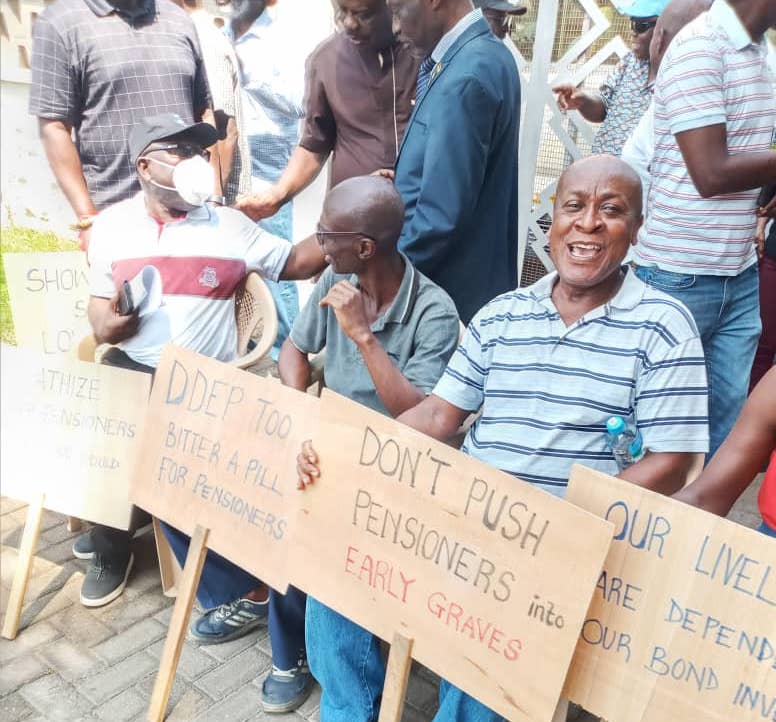
A zoom in on Prof. Kweku Osam, picketing at the Ministry of Finance, with his fellow pension bondholders
BACK TO THE PENSIONERS
So what exactly are we working for? The calibre of pensioners-turned-picketers is disheartening: doctors, engineers, civil servants… If retired professors and chief justices are protesting, what about the no-namers and the many who are too old or too ill to hit the streets? I am privy to a WhatsApp message Prof. Kweku Osam sent that was meant to be just informational, but ended up being very transformational for me:
The last time I took part in a public demonstration against a government of Ghana was in May 1983, as a fresh graduate student. That was when students in the country rose up against Rawlings and his PNDC. Today, God willing, I’ll join fellow Pensioner Bondholders to protest at the Ministry of Finance. The government should leave Pensioner Bondholders alone. Touch not the Pensioner Bondholders.
Think about it: Uncle Kweku began his working life protesting the government. Forty years later, he is ending his working life with yet another anti-government protest. Virtually all his lifesavings is now being held at ransom by a government that has misled and mismanaged her affairs, Covid-19 and Russia-Ukraine notwithstanding. After forty years of wandering in the wilderness between the 1983 protest and the present one on the eve of our sixty-sixth independence commemoration, Ghana itself is a pensioner by age, without much to show for it. We’ve got to do better for our people, old and young alike. Seriously.
Prof. Osam’s generation–my parents’ generation–is the same one the current Finance Minister, Uncle Ken, belongs to. It is the same crop of people who plotted military coup d’etats a generation ago in their youth. Now they won’t exit quietly either, not without a financial coup de grace. With trepidation, dare I call them the lost generation? And they did not only lose themselves and their way, they lost money–theirs and ours.
But to what will my generation and those following rise, having clearly observed that Ghana is not worth living for and Ghana is not worth dying for? That’s how many feel at the moment. Honestly. Think about it.

O National Cathedral of Ghana: My Hopes and Fears Have Met in Thee.
In the interest of full disclosure, first of all I am a Bible-believing, Jesus-following, Spirit-filled African Christian. Secondly, at the time of writing, I have no membership of any political party—just a citizen who passionately loves his motherland and has served both major political parties when called upon. Finally, I comment on the National Cathedral of Ghana matter primarily as a missiologist and leadership scholar. These thoughts were largely shared on the Cit FM/TV current affairs programme The Big Issue on 21st January, 2022. The crux of my submission, that the project be halted and audited, was also carried on Citi News Room here.
THE THING THAT I FEARED HAS HAPPENED
My first article on the proposed National Cathedral of Ghana in August 2018 was entitled in a manner that exposed the battle that raged within me upon hearing the president of the Republic of Ghana announce his vision to put up a national cathedral. It was an inquiring heading: “National Cathedral: Vulgar or Virtuous Venture?
In it, I confessed “my unwholly holy initial thoughts, honest-to-God,” sharing my initial skepticism about the project, mainly concerned about it being a mere political scheme to siphon monies, only with a nice religious façade. Secondly, I questioned the prudence of it amidst the poverty and sheer lack of basic infrastructure and public services in a developing country (NB. This was before Covid would hit and make everything that was bad, worse). Thirdly, I was wary of the perilous path of Europe where centuries old grand cathedrals now only stand as emblems of a once-upon-a-time vibrant Christendom while the faith itself is dying today, precipitously. Even then, one need not cross the oceans to note the dangers of religious opulence over pragmatic faith. Just look next door, right across the Ghana border to the near-white elephant of the Notre Dame de La Paix in Yamoussoukro, whose proposed community-impacting hospital as an attachment to assuage the papacy’s guilty conscience is till yet to see the light of day, thirty-two years later.
As I studied the cathedral proposal further, especially as an African missiologist, its merits rose above my cynicism and mounting hopes tamed my fears to the extent that I was willing to give the project a chance, even my support. In fact, not only was I present at the foundation stone-laying, I wrote a cogent trilogy about how even the president might not be fully aware of the extent to which Almighty God may be using him to accomplish His glorious purposes in and through Africa, especially considering this unique moment in history where the once derided “dark continent” now has more Christians than any other continent and will double that lead by 2050, with more Christ followers than the next two continents (Latin America and Europe) combined! In fact, a summary of the trilogy even made its way into the Cathedral’s published magazine.
Over the last couple of years since then, I have found my faith in the project on a slippery slope back to where it first began, with supposed scandal after seeming scandal and allegation upon allegation that rival the corporate sins of the Arthur Andersons and Enrons at the turn of this century (if not making them pale in comparison), that do not befit an edifice for the King of kings. The opacity in the project’s financial dealings, including estimated project costs, eye brow-raising fund transfers and amorphous government seed money, make nonsense of the God who is light, in whom there is no darkness at all. The purpose of this rejoinder is not to dive into each of the smudges and spots on the project but to put on record that while I have enumerated prior at least a dozen reasons this could be a virtuous project, like ‘the greatest man in the East’, for me too, “the thing I greatly feared has come upon me” (see Job 3:25-26). I seek to document for posterity my revised position on the National Cathedral of Ghana for not only are my values being violated, the very faith in whose name this edifice is being erected is endangered.
NOODLED & NUANCED
This cathedral matter is a very nuanced one and thus requires the highest levels of leadership competence, care and character to navigate it. What do I mean? Four things. First of all, the president is not a king; he cannot just pronounce edicts, fiats and decrees at an enlightened citizenship. Secondly, we don’t live in a theocracy, but in a fairly vibrant democracy (although admittedly we are a pseudo secular state with our national anthem and pledge referring to ‘God’). Thirdly, private-public partnerships can be a tricky dance. And finally let’s face it, things are hard socioeconomically right now!
As if all of this is not enough, the president in particular hasn’t shown the kind of great leadership in casting vision (constantly, compellingly, creatively) and galvanizing the people from the grassroots. To make matters worse, the government itself has lost the trust of the Ghanaian people with its economic mismanagement, real and imagined, poor emotional intelligence in matters like this and poor consultation culture–from this cathedral issue through the recent e-levy saga and even current Domestic Debt Exchange debacle.
Then the process itself has been fraught with paucity of information and poor communication, poor governance (really governance 101), low accountability and too much opacity. In fact, in my frustration the other day while preaching on an Ephesians chapter five text about leading and living in the light I bellowed, “Stop the Cathedral in the name of the Lord!”
Don’t get me wrong. There are pluses about this project. Many. Between my initial article and the subsequent trilogy you will easily find a dozen cogent reasons why this could be a virtuous venture, including how the cathedral is more than a building (although the Africanization of it, its tourist attractions and income generation nature per se are all something to write about). The fact that the cathedral has a mandate to be a convenor of national conversation and debate warms my heart.
If the government had kept to its initial promise of providing “just the land” and only “seed capital,” I’ll be at peace. It is for the body of Christ to build this cathedral to the glory of the LORD, but considering the nature of Christianity in our Ghanaian public sphere and the prime place of faith for the African this is a nuanced matter. Any good government would have a keen interest in this matter, hence the sense in situating the NCG in the country’s capital city’s ceremonial core to provide “the missing link” (words of the architect) as a final piece of a national puzzle. Apparently, the other national pieces are all already in place: the people’s place (international conference centre, national sports stadium), the people’s representatives’ place (parliament building and State House), the peoples’ heroes’ place honouring the dead (Osu cemetery and adjoining military cemetery).
Granted, it isn’t everyone who is able to appreciate that we are a building a nation here; not just an eclectic collection of utilitarian infrastructure. That’s how come although we still have children learning under trees we still have national stadia and presidential edifices like Jubilee House and Peduase Lodge. To build or not to build this cathedral is really a nuanced and noodled matter that requires a certain high level leadership that I, honestly, haven’t seen on the horizon.
THIS ISN’T A ZERO SUM GAME
As a missiolgist, I believe that even the president does not fully know or understand the magnitude and implications of his vision. His initial vision may have been personal but vision is often progressive and it is possible He is being used by the Sovereign God in ways the man himself cannot fully comprehend, let alone the masses crying out against this vis-à-vis the impoverished state of the state. In order not to repeat the dozen or so cogent reasons why this project can be worthwhile, I will strongly encourage you to take a look at trilogy 1, the second part and the final installation, all from March 2020.
GOING FORWARD: SEVEN STEPS
1. STOP! STOP! STOP!
This may very much sound and look like the ‘STOP WORK’ in red paint on uncompleted building projects by the Accra Metropolitan Assembly (AMA) yet, I see red flags all over this project that require concomitant red paint markings all over it too. This is not from the AMA this time. Just “we the [Ghanaian] people” saying, “STOP WORK!”
2. AUDIT
Secondly, let us get any of the so-called ‘Big Four’ global auditing firms in the country to do a thorough audit of the NCG secretariat, board of trustees and other associated names like JNS Talent etc.
Sometimes those AMA signs not only read, “Stop Work” but continue with “Produce Permit.” I would say for this cathedral project, in conjunction with step one, let us also “Stop Work and Produce Audit.” The result of the audit will help clarify our next steps—if even this project should continue at all, and if it should, how.
3. CALL FOR CONVERSATIONS AND DEBATE
Let us on purpose have a broader conversation and debate of the best minds and hearts for the way forward. “In the multitude of counselors there is safety,” said the wisest man that ever lived. And this is a sagacious king who could’ve easily ignored the counsel of others. Interestingly, he put up the most magnificent temple in the whole world in his day, for YHWH. Even Africans like the Queen of Sheba travelled long distances to come and see. If we want to see the reverse today, others come from elsewhere to behold the magnificence of the NCG, then we had better consider wise, broad-based consultation.
In my humble opinion, this government has been unbelievably militaristic; so non-consultative! Yet the thing is that even if people do not agree, they will support the project, or at least not be as antagonistic, because they have been seen (recognized) and heard. Conversations and debate will cause the significant groundswell needed for such a massive national venture with international ramifications.
4. GIVE OURSELVES TIME
If from the pause, audit, conversations and debates it becomes apparent that this project should continue, then we must give ourselves time. This cathedral doesn’t have to be built by 2024 and ready for a January 2025 swearing-in. That is precisely part of the problem with this project: the fact that the president is in a hurry to put this up while he is in office.
While a sense of urgency is good, undue pressure because of time crunches leads to many mistakes and often unethical behaviour, no matter how hitherto virtuous one’s cause. For example, this strange exchange of over two million Ghana Cedis between a whole national project and a private individual’s company obviously happened because apparently the project couldn’t wait for government funds to clear (this issue is under investigation, and rightly so). Besides, things are über hot in the economy right now, Ghana’s caught up in a socioeconomic inferno. It is wisdom to let both the times and tempers cool off.
If this is truly a national cathedral and not H.E. Nana Akufo-Addo’s pet project, then it should stand the test of time by traversing other administrations—perhaps two or even three terms down the line, including opposition parties—and be owned by all and sundry. If is by the good people of Ghana it for the glory of Almighty God, then we are not in a hurry. When we are not in a hurry we can think properly, do things appropriately, follow due process… Time is money and time will save us a lot of money—and a multitude mistakes.
5. TRANSPARENCY! TRANSPARENCY! TRANSPARENCY!
“This is the message we have heard from him and declare to you: God is light; in him there is no darkness at all” (1 John 1:5, NIV). Even some corporations have more transparency and better governance than the current supposedly religious project. Anathema! If this is truly an edifice to the Most High God then there cannot be even a hint of inappropriateness and misappropriation. As it stands now, not only has there been too much darkness and opacity surrounding a building that is to be a Lighthouse for the nations; too many allegations and suspected scandals that even some ordinary government projects cannot rival.
My mind goes to another cathedral project’ in ancient times where it was said, “They did not require an accounting from those to whom they gave the money to pay the workers, because they acted with complete honesty” (2 Kings 12:15, emphasis mine). I’m afraid we cannot say this of the NCG people or process so far.
6. LET GOD’S PEOPLE BUILD GOD’S BUILDING
The government of Ghana has done more than enough, giving the land. And way more seed than was my impression at the start of the project. If this sanctuary is really for the LORD then let’s let the Body of Christ in the country build it. And yes, we can! Christians have literally put up thousands of edifices strewn across the length and breadth of the country, ‘from Gambaga to Accra, from Wiawso to Keta.’ Let the Church do this for the glory of Almighty God. We thank the generous government of Ghana for the head start but no more government/tax-payers’ funds, please.
Let God’s people be able to say, like in Nehemiah’s day, “The God of heaven, he will prosper us; therefore we his servants will arise and build.” Whenever God gives a vision, He also makes the provision. But if this venture isn’t of God, then we are on our own; it will be hard.
For a number of great cathedrals that have been built, people have felt so privileged to be a part of the history-making that they have voluntarily given, not just of their substance but of their very selves. Carpenters, masons and other artisans and professionals have offered their services for free, and not the case of exorbitant amounts being paid to the current architect and others. In my opinion, the celebrated architect should feel so privileged to do this for God and country that he does this gratis! You tell me how much we paid the designers of our national flag and presidential stool; or composers of our national anthem and pledge.
7. WORK AS PASSIONATELY ABOUT OUR ‘SOFTWARE’ AS WE ARE ABOUT THIS ‘HARDWARE’
By software I mean our values, our paradigms and attitudes etc. The nation is so full of poor work ethic, corruption, filth (environmental and figurative), incompetence, dishonesty, lack of integrity etc. yet we want to build a magnificent cathedral for God. There is so much grievous poverty in the lives of the majority yet we want to put up this ceremonial and celebratory infrastructure at a cost of $400 million in the heart of Accra. The scriptures are replete with what God requires of us, first and foremost, and it is not so much physical buildings as that our spiritual, social, mental and emotional states reflect His glory; also, that our physical bodies will be hallowed as His temple. So as we are excited about the hardware (physical building of a cathedral), o how I pray that we are equally excited to work on our values, attitudes, morality, ethics, true selves, true faith and integrity. We also ought to disciple our sectors and systems of Ghanaian society so that these reflect a people that believe in a righteous and excellent God, the Most High.
CONCLUSION
Despite the bold vision of the NCG, we haven’t as a people or leadership displayed the kind of competence (eg. vision casting, convincing communication, broad consultation), character (eg. transparency, accountability) and compassion (eg. sensitivity to the present economic plight of the Ghanaian people) that a project of this magnitude demands.
I believe if we took the above seven steps, that should put us in good stead and hopefully lessen the painful memories and bitter aftertaste that this project would otherwise bring us. I do not believe the NCG is an entirely vile venture; but neither will it be entirely virtuous without great leadership in its purpose and process. Repentance and restitution must take place where the audit finds wrong and the best way forward forged as a body politic. The virtues in the idea of a national cathedral can be redeemed and the dead and near-buried hope and glory resurrected. This project can still bring God glory and bestow blessing on not just Ghana but the nations of the world if we would be quick to vanquish the evils that crouch at the foundation and front steps of this edifice. But for now, both my hopes and fears of these past six or so years have come to a head in this embattled National Cathedral of Ghana project.
Post Script
It was heart-warming to find that a couple of the National Cathedral’s Board of Trustees members, namely Archbishop Nicholas Duncan-Williams and Rev. Eastwood Anaba, reiterated my January 21 call above to ‘stop work and produce audit’ barely two days later, January 23, 2023. It was soon followed by a formal press release by the chair of the Board, Rev. Prof. Opoku Onyinah the next day, following a January 23, 2023 Board of Trustees meeting at which they agreed to engage Deloitte, one of the Big Four accounting firms in the world, to carry out an audit.
The hope expressed in the final paragraph of the said press release is mine too: “It is the hope and trust of the Board of the National Cathedral of Ghana that once these nagging issues are satisfactorily dealt with, the public interest and confidence in the project would be restored and rekindled to enable the citizenry to contribute generously to complete the Cathedral to the glory of God.”
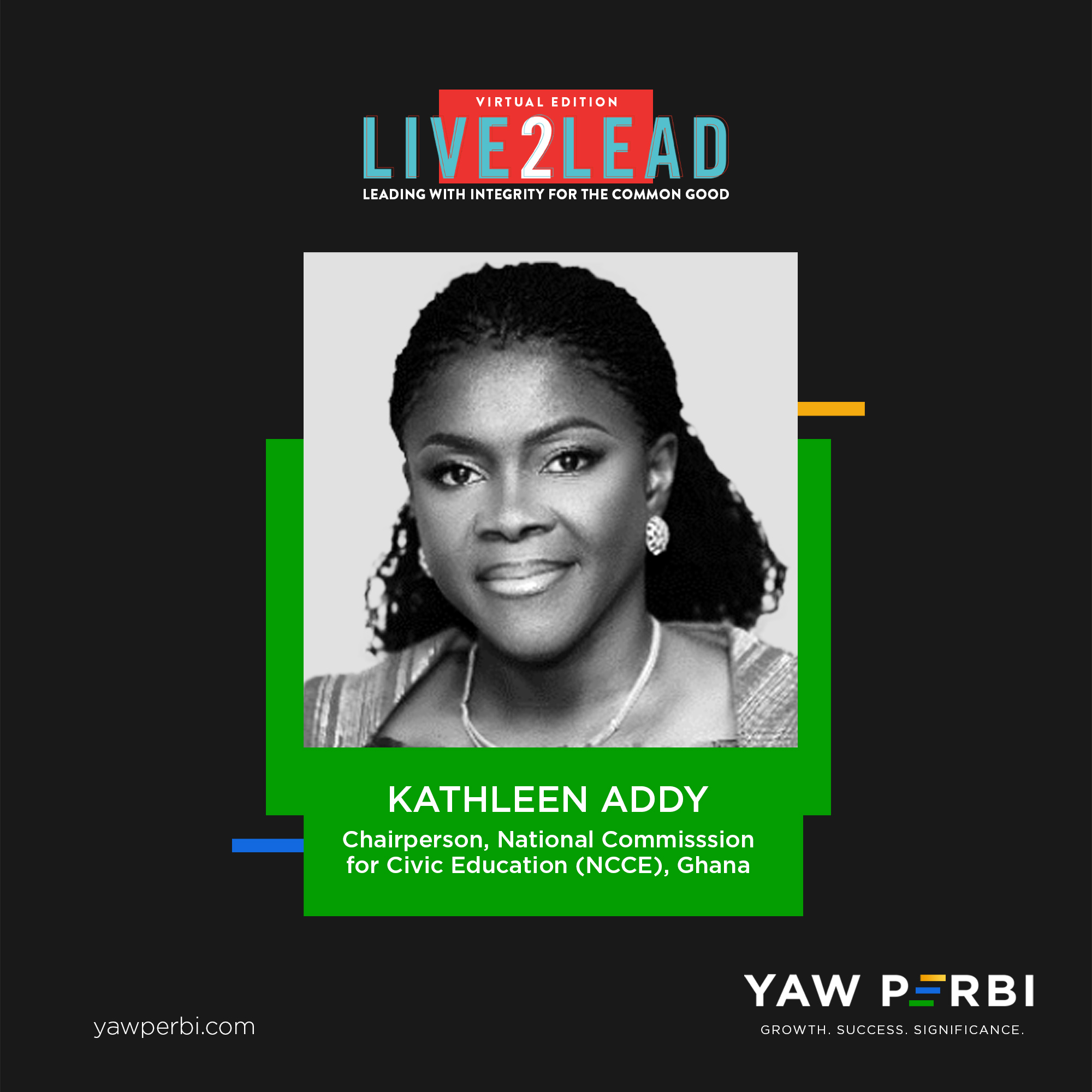
Meet Kathleen Addy, the Lady with Gravitas for Civilitas
Kathleen Addy is the Republic of Ghana’s National Commission for Civic Education (NCCE) chairperson, appointed in 2022 by the president of the Republic from her Deputy Chair of the Commission role. Ms. Addy had been in charge of Finance and Administration since 2017. Kathleen is highly regarded as a civic activist with particular interest in women’s empowerment as well as accountable and responsive governance, and has supported different civil society groups fighting for good governance and women’s rights in Ghana.
She was once upon a time a Research and Communications Officer at the Center for Policy Analysis focusing on Women’s Economic Empowerment and was the Afrobarometer Communications Manager at the Center for Democratic Development. Kathleen holds a first degree in Psychology and a Master’s in Communications from the University of Ghana, Legon. She is also an alumna of Achimota School and Holy Child School. In her role as a Chairperson of the NCCE, Ms. Addy brings her expertise and vast experience in the development sector, as well as her passion and drive to bear on the work of the commission.
Gravitas was one of the ancient Roman virtues that denoted “seriousness.” It is also translated variously as weight, dignity, and importance and connotes restraint and moral rigour. It also conveys a sense of responsibility and commitment to the task. Kathleen’s got gravitas. Meanwhile cīvīlitās, the feminine Latin word that speaks to politics and the art/practice of government, also connotes courteousness, politeness, dignity, civility, moderation, and restraint. Not only has Lady Kathy got all these, she has a passion to see every Ghanaian born of a woman possess these, and in abundance too, hence her passion for civic education.
INTEGRITY AND A NEW GHANA
At the just-held Live2Lead conference, the First Lady of Civilitas began her submissions with a chuckle, as she noted with candour how the public sector from which she hails has become the poster child for lack of integrity. She herself shared how coming from think tanks and CSOs, she got a culture shock when she first landed in the public service in 2017. “A lot of people don’t even know what the wrong thing is because wrong has been normalized,” she asserted.
But she ended with a ROAR. By the time she had shared how ‘friends and family’ who expected favours like getting an upper hand in the commission’s hiring had had a rude shock that she only gave them enough support to follow due process, the audience would doff their hats for such a principled public sector leader. We trust that the many public sector folks sponsored to attend were inspired to also lead with integrity, right in the corner where they are.
CONCLUSION
Live2Lead Ghana was wildly successful. We give glory to God. The plan to strategically rope in the public sector was a good idea and well-executed. We are grateful to all our corporate partners whose generous sponsorship made this possible, and the participation of several emerging leaders from our schools and universities. The dozen or so organizations and companies who ensured 10 or more of their leaders were present are true patrons of a Ghana that can be lead in integrity for the common good. One bank sponsored nearly 60 of their leaders, while another invested in 40 of theirs. Poco a poco, intentionality about leadership development will become a culture that rewires our nation for growth, success and significance.
God bless our homeland Ghana with gravitas for civilitas, and make our nation great and strong.

Meet Patrick Lencioni, the Workplace Guru.
There’s no one I enjoy hearing about teams, meetings and workplace dynamics like Patrick Lencioni. Patrick is an American author of books on business management, particularly in relation to team management. He is best known as the author of The Five Dysfunctions of a Team, a popular business fable that explores work team dynamics and offers solutions to help teams perform better. On a recent trip to southern and eastern Africa, his cautionary tale to CEOs published in a book by the title The Motive, was my jolting companion. It brought me back to my senses as CEO of a few enterprises.
Lencioni is Founder and President of The Table Group, a management consulting firm specializing in executive team development and organizational health. As a consultant and keynote speaker, he has worked with senior executives and executive teams in organizations ranging from Fortune 500s and high tech start-ups to universities and non-profits. He also gives talks on leadership, organizational change, teamwork and corporate culture. He is frequently interviewed for national media including features in the Wall Street Journal and USA Today.
SIX TYPES OF WORKING GENIUS
At the annual John Maxwell Live2Lead conference last week–the Ghana site hosted nearly 600 leaders LIVE! with thousands more to benefit through rebroadcasts–we heard from Patrick Lencioni about his groundbreaking new model that provides a deeper understanding into our workplace and team dynamics.
The six types of working geniuses together form the word WIDGET, symbolized by six gears working perfectly synergistically well together. W is the genius of Wonder, I the genius of Invention, D the genius of Discernment, G the genius of Galvanizing, E the genius of Enablement and T the genius of Tenacity. In the near future we shall provide a fuller blog delving into further details about these six geniuses. In the mean time hear Pat the sage, “If you want to be successful and fulfilled in your work, you must tap into your gifts. That can’t happen if you don’t know what those gifts are.”
THINGS DON’T HAVE TO BE THIS WAY
Pat explained how people don’t understand their personal areas of working genius, which impacts their ability to identify work opportunities that would be most meaningful to them, as well as disallowing organizations, teams, and families to help individuals tap into their true working genius, resulting in a failure to reach one’s true potential. But things don’t have to be this way. This tragedy is avoidable, as Pat shared how you can identify your working genius and understanding which one of the six geniuses both you and your teammates are. Contact us, the Live2Lead team, if you and your team would want to test your genius to become all you really could be. There are no dumb or lazy people on the planet or on your team; only geniuses who are yet to find and fire up what makes them tick!
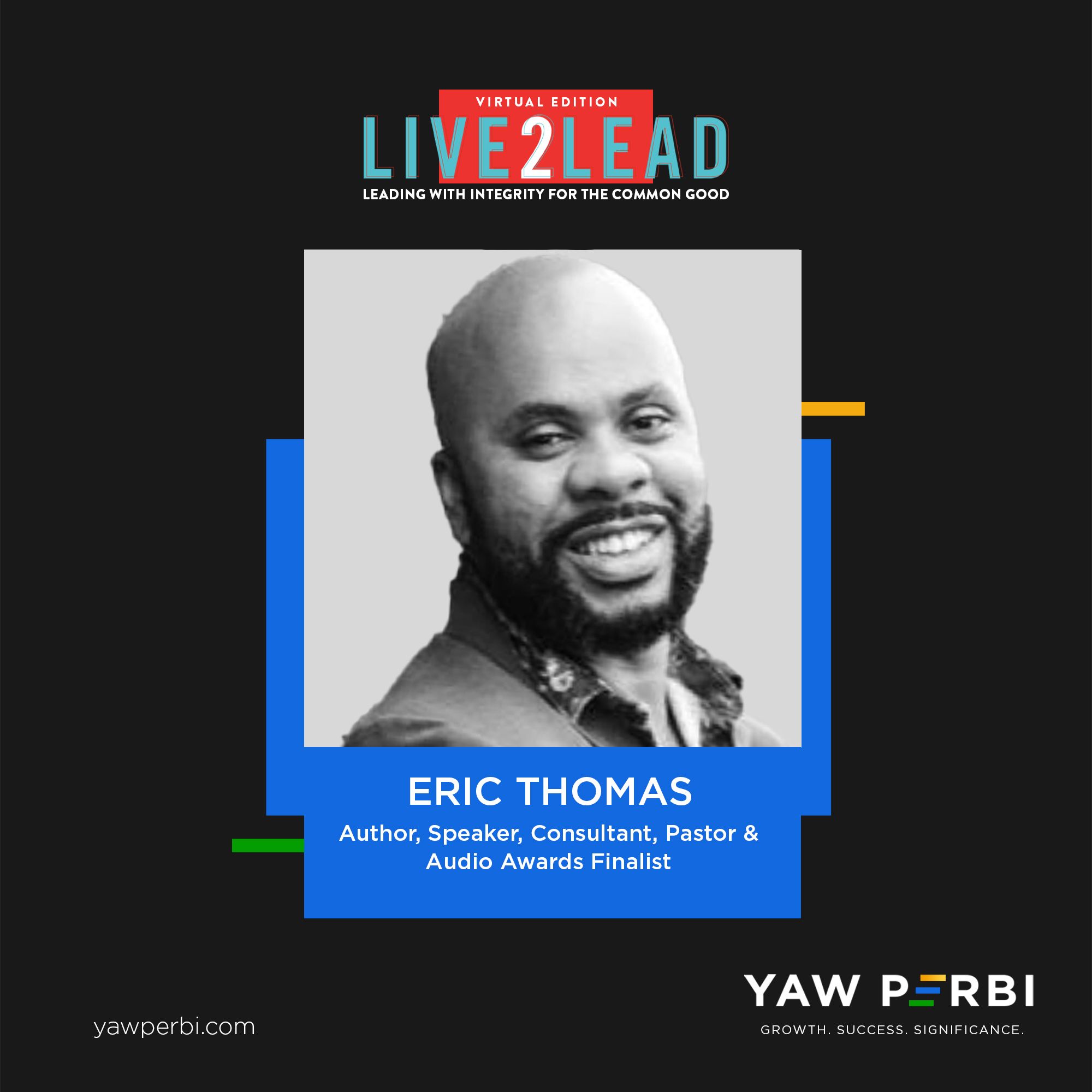
Meet Eric Thomas, a Fireball to Light a Fire Under You!
Eric Thomas, Ph.D., is a critically acclaimed author, world-renowned speaker, educator, pastor, and audible.com Audie Awards finalist. ET, as he is better known and affectionately called, has taken the world by storm, with his creative, common-sense approach to living a successful, satisfying professional and personal life. Through a significant social media presence and regular domestic and international tours, “ET, The Hip Hop Preacher” has become a global phenomenon!
As CEO of his Consulting Firm, ETA LLC., Dr. Eric Thomas has led his team through the doors of dozens of hugely successful organizations and Fortune 500 companies such as General Electric, Quicken Loans, AT&T, Nike, Under Armour, New Balance, and UPS and continues to consult for major league sports franchises within the MLB, NBA, NFL, MLS (various United States sports leagues).
YOU OWE YOU
That’s Eric’s philosophy of life, and his topic at Live2Lead on October 7: You Owe You: Ignite Your Power, Your Purpose, and Your Why. Come learn the key principles of how to turn a mentality of struggle into strength, resulting in enduring success. Eric Thomas shares his urgent message to stop waiting for inspiration to strike and take control of your life, using stories of his past and lessons learned as examples.
He will help identify how you can rewrite your life’s script and capture the attention of all kinds of people in a multitude of different environments. Sharing these critical first steps will help you with understanding yourself and the world around you, finding your why, accepting that you may have to give up something good for something great, and constantly stretching toward your potential.
Pump up your personal, professional and leadership game at this year’s Live2Lead conference. Register now through this link. Nag your organization until they join this rising movement of learning leaders that will transform society by becoming a Patron of Live2Lead. A Patron company is one that sends at least 10 leaders to Live2Lead, and this year they range from mining companies like Goldfields to banking greats like Stanchart. There’s no way we can have at least 100 such Patron organizations and companies in Ghana and not transform the nation, one leader at a time, one centre of excellence at a time. Together we can change our country and continent for the better! Let’s do this! Register here, and NOW.
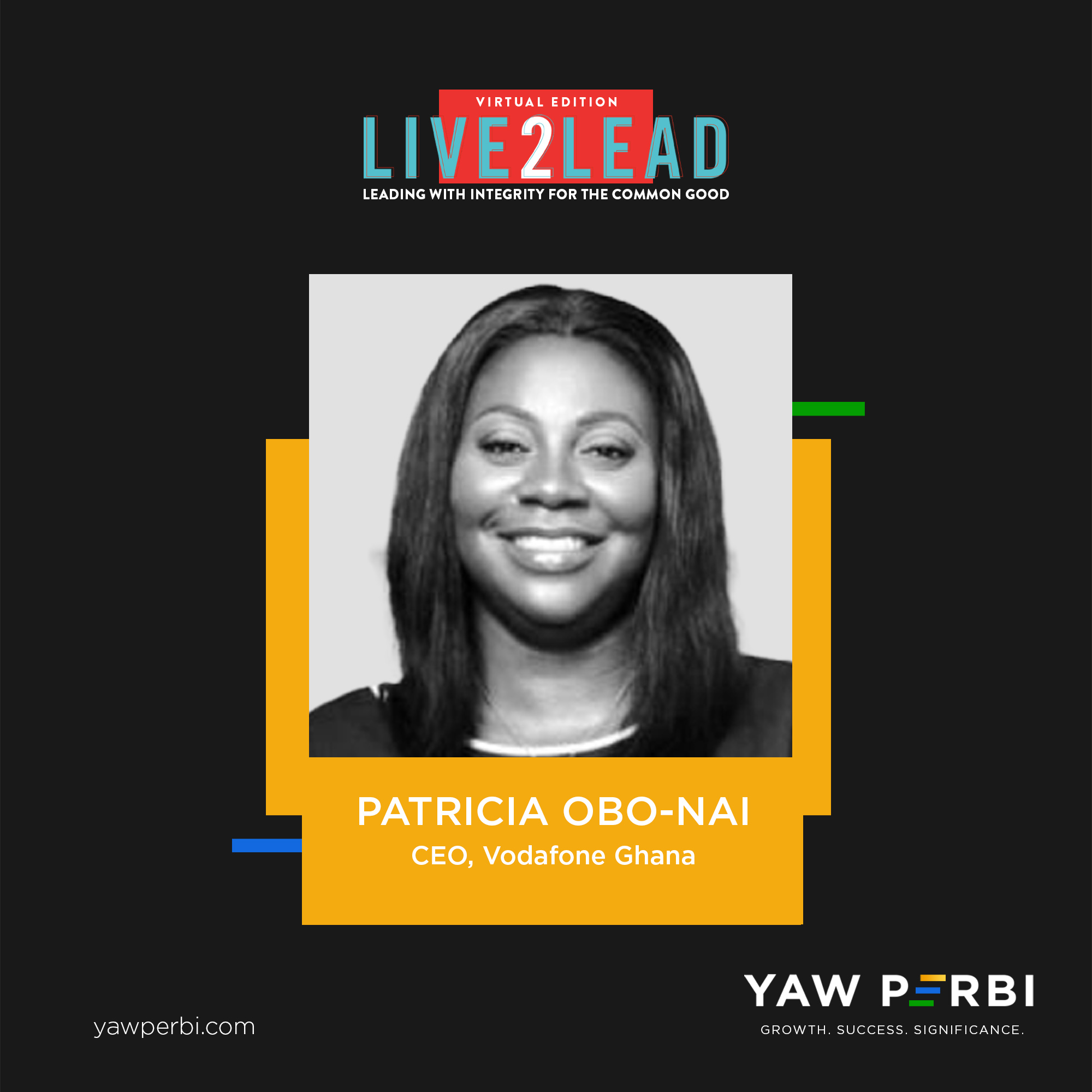
Meet Patricia Obo-Nai, Telecom CEO of the Season.
Patricia Obo-Nai is one of the most influential CEOs in Africa, a leading figure in the telecom sector. Don’t let her cool fool you. It is not for nothing that she is not only the first ever female CEO of Vodafone Ghana but the first Ghanaian to do so. Period. Her outstanding leadership has been recognized by many, including Mobile Magazine Africa, which named her the “First Lady of Mobile in Africa.”
Patricia started her career as a Network Planning Engineer with Millicom Ghana Ltd. (Tigo) in 2000. She holds a BSc in Electrical/Electronic Engineering from the Kwame Nkrumah University of Science and Technology (KNUST) and an Executive MBA in Project Management from the University of Ghana Business School. Regarding international education, she holds executive education qualifications from both sides of the Atlantic, Kellogg School of Management in the USA and INSEAD in France. Patricia is passionate about the future of young people and women in the digital age and is a vigorous advocate for STEM. She has been on several platforms, including the UN General Assembly panel sessions, advocating for youth and women.
Among Mrs. Obo-Nai’s dozen plus prestigious awards are the recent Women Leadership Excellence Award at the Ghana CEO’s Network Summit and the Africa’s Most Respected CEO Awards in the continent’s Telecommunications Industry, both of 2021. She is a CEO of CEOs.
WHAT IS GOOD TECHNOLOGY WITHOUT GREAT VALUES!
Even before getting into the so-called ‘soft’ issues of leadership, like integrity, as an electrical engineer Pat knows the hard consequences of conductors, currents, circuits, capacitors and such that have no integrity. Nothing of enduring value happens without integrity. At the October 7 Live2Lead conference this year, Patricia will exhibit through her life and leadership how “the glue that holds all relationships together–including the relationship between the leader and the led–is trust, and trust is based on integrity” (Brian Tracy).
Mrs. Obo-Nai will share how she manages to lead with integrity for the common good despite the high corruption in Ghanaian society, everywhere one turns. During an April visit to Ashesi earlier this year, the celebrated CEO of Vodafone Ghana highlighted lessons from her 20-year career. Embedded in those gems was a reminder to students about the importance of having integrity.
Tune up your personal, professional and leadership game at this year’s Live2Lead conference. Register now through this link. Nag your organization until they join this rising movement of learning leaders that will transform society by becoming a Patron of Live2Lead. A Patron company, like Patricia’s own Vodafone, is one that sends at least 10 leaders to Live2Lead. There’s no way we can have at least 100 such Patron organizations and companies in Ghana and not transform the nation, one centre of excellence at a time. Together we can change our country and continent for the better! Let’s do this! Register here, and NOW.


